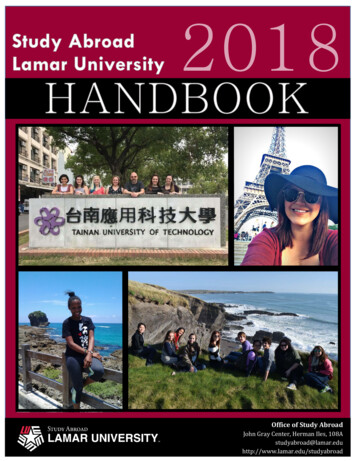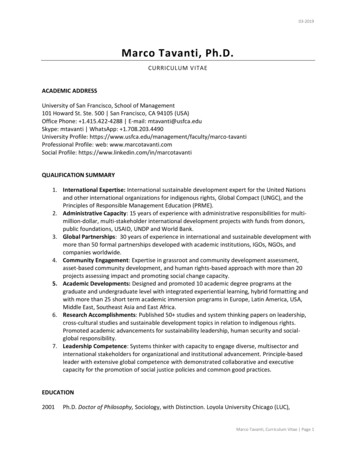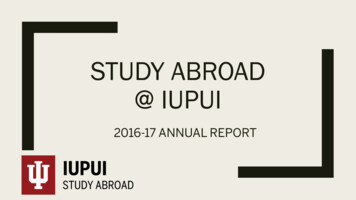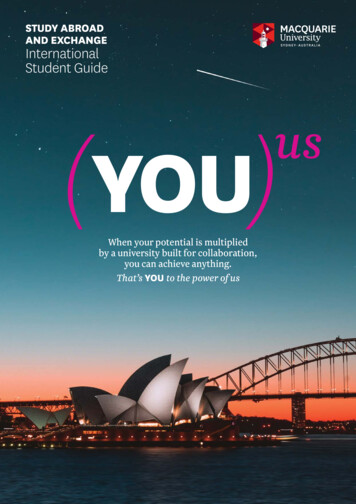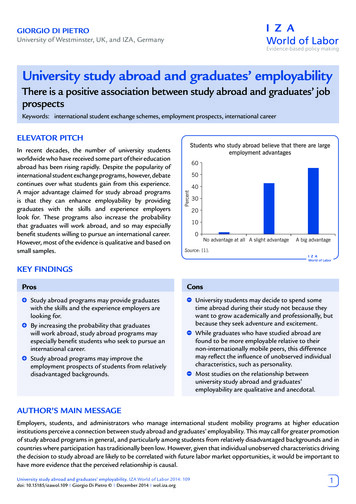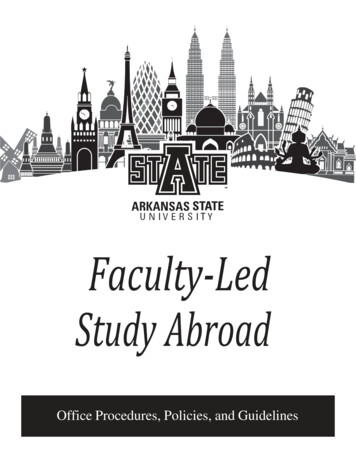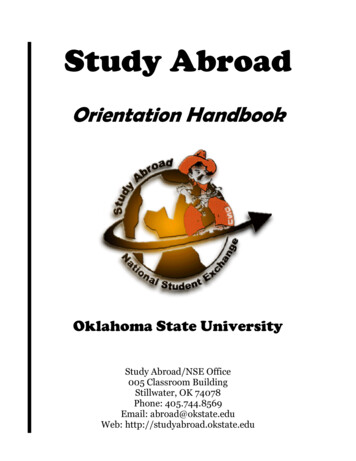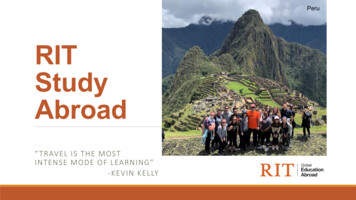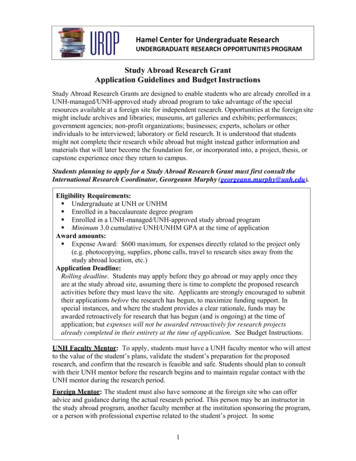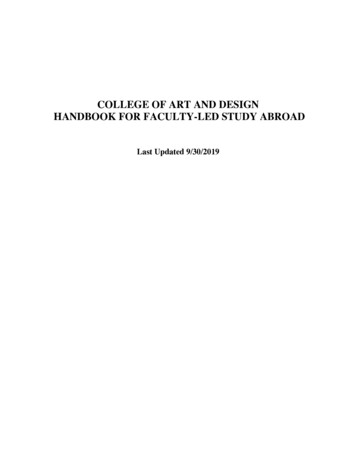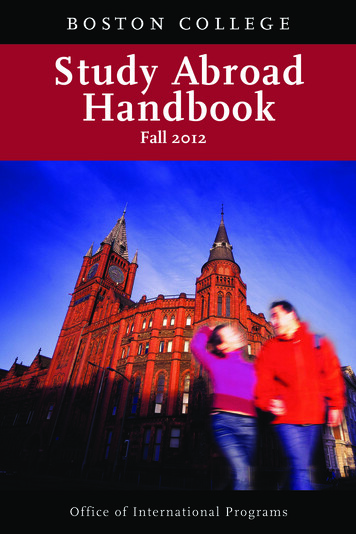
Transcription
boston collegeStudy AbroadHandbookFall 2012Office of International Programs
Dear International Study Participant,Congratulations on your study abroad plans for the upcoming semester oracademic year. I hope that your international experience will contribute profoundly to your development as a person, a scholar, and a global citizen.Boston College hopes for no less.We have compiled this handbook to provide you with information that youwill need to prepare for your experience abroad. While you will also receiveinformation directly from your host institution or organization, please reviewthis handbook now and share the information with your parents. We havedrawn upon years of experience to provide, in very short compass, information on everything from visas and health to packing and cultural preparation.While increasing numbers of Boston College students have already hadsignificant international travel experience, relatively few have had a sustainedexperience of living, working or studying abroad. This poses great and exciting challenges and promises to pull you far beyond your normal comfortzone. Please welcome that challenge. Resist the temptation, so ready at hand,to retreat into the electronic cocoon afforded by current technology.How might you make the most of your study abroad experience? Work tointegrate into your host environment. Keep in mind that the transition intoyour new setting will not be seamless, and you may not have the sameservices that are available at Boston College. Take advantage of the strengthsof the host university and community and try to live as the local students live.Join student organizations, do volunteer work in the local community, set upinformational interviews with local companies.do whatever it takes to meetlocal students and residents. Try, as best you can, to live in and with thebeing a remote bystander.And if you face difficulty or experience confusion, let us know. Our office, andBoston College at large, is always ready to help.With best wishes,Richard KeeleyAssociate Dean, Carroll School of ManagementInterim Director, Office of International Programs1www.bc.edu/international
T ABLE OF CONTENTS PRE-DEPARTURE CHECKLIST TRAVEL PREPARATIONS 44556789AT BOSTON COLLEGE Travel DocumentsTravel ArrangementsFinancesMedical InsuranceHealth PreparationsPackingPre-Departure ResearchCommunication and Technology3Final ConfirmationFinancesCourse ApprovalBC Housing10111111AFTER ARRIVAL ABROAD Cultural AdjustmentComputing SupportAcademicsSafeguarding Documents andValuablesObeying Local LawsStreet Smarts12121314 TEN GOLDEN RULES FORSTUDY ABROAD SUCCESS15 OIP CONTACT INFORMATION16 www.bc.edu/international14142
P RE-DEPARTURE CHECKLISTTRAVEL PREPARATIONS Conduct pre-departure researchApply for a passport and visa if neededMake travel arrangementsPlan your financesArrange medical and dental check-upsObtain necessary vaccinations and prescriptionsRegister online for HTH medical insuranceMake a packing listAT BOSTON COLLEGE Complete a Final Confirmation and Clearance Form for Study AbroadPay all BC and external provider billsComplete a Consortium Agreement (only for financial aid recipientsattending an external program)Obtain BC course approval for major, minor, and core requirementsLife to sublet your apartmentSubmit a mail forwarding address to the McElroy post officeON-SITE SAFETY PLANNING Read health, safety, and travel recommendations for your destinationMake copies of all important documentsPurchase a money belt or neck pouch at a travel storeGive a relative your travel itinerary and contact informationCONTACT OIP WITH QUESTIONS AND FEEDBACK3www.bc.edu/international
TRAVEL PREPARATIONSTravel DocumentsPassport and Visa To study abroad, your passport must be valid for at least six months afteryour U.S. return date. Visit www.travel.state.gov for passport and student visainformation. Non-U.S. citizens should check with their consulate about visasand passport renewal procedures. If you attend a BC program and your host country requires a visa, your OIPadvisor will provide you with further details on the application process. OIPalso provides visa assistance for some external programs. External programstudents should also check with their provider. Keep copies of all passport and visa application documents you submit. If you travel through other countries en route to your final destination, evenif you just switch planes, you may also need a transit visa. Check on this before departure.Travel Arrangements You are responsible for your own travel arrangements. If you arrive before the start of your program, book accommodations forthat time. Youth hostels are a less expensive alternative to hotels. Keep in mind that most rail and airline passes must be purchased in theU.S. before departure. Read all guidelines and restrictions before purchasing airline tickets andpasses. Remember that most airlines charge fees if you change your traveldates after purchase.Web .bc.edu/international4
Finances In most countries you can use credit, ATM, and debit cards. Your ATM cardmust have access to international networks (e.g., Cirrus, Plus). If you have aPIN with letters, know the corresponding numbers. Check on overseas fees,which can vary by bank. Have a credit card PIN for possible cash advances. Many U.S. banks have international partners that do not charge ATM feesor charge reduced fees. Ask your bank about their international partners. Take travelers checks and another ATM or credit card as a back-up. Leavecopies of all bank cards in the U.S. Take your bank international customerservice numbers abroad. Notify your ATM, credit, and debit card banks before departure. Otherwise,they may think your cards were stolen once you use them abroad. Research what is needed to open an overseas bank account. It may not bepossible to open an account everywhere, and other places may require it. Itmay take 5-10 business days to activate a new account. OIP web site for BC program estimates). Prepare a budget. Take 150- 400in local currency with you upon arrival. The recommended amount you willneed varies by location.Medical Insurance You must maintain your domestic medical insurance coverage. HTH insur carrier. BC program participants who do not use the BC plan must waive theinsurance through Agora. External program students who choose the BC carfrom Student Services and submit it to the provider. All BC students will also be enrolled in the HTH Worldwide Insurance plan.External program students with comparable coverage may be eligible for anHTH waiver. Visit the OIP web site for details on eligible programs. You are required to register online for HTH medical insurance(www.hthstudents.com) after receiving your insurance certificate number. For a comprehensive description of HTH Worldwide Insurance Services,visit the HTH portal (www.hthworldwide.com) or see www.hthstudents.com. An HTH fee is placed on your BC bill each semester you are abroad. HTH insurance coverage dates are listed by program on the OIP web site. Ifdates, it is recommended that you extend your coverage for an additional fee.Visit www.hthstudents.com/ge.cfm?ac EVH-8208 for further details. Keep in mind that HTH does not cover you within the United States. Download your HTH membership card from their web site. Carry this cardat all times. You will need the card if you seek medical treatment abroad.5www.bc.edu/international
Health PreparationsStudents with Chronic Illness If you have a physical or psychological condition that requires ongoing treat-ment, you must consult your physician or counselor about your plan to goabroad. Seek their advice about your options and discuss your overseas medical care. Consider possible consequences of stress from cultural adjustment andreliance on different medical practices. You are strongly encouraged to inform on-site staff about any medical condition for which you may need special assistance. Do this before you arrive.Check-Ups and Vaccinations Have medical and dental exams before departure. Check that all of your vaccinations are current. Certain countries may alsorequire or recommend vaccinations against specific diseases before departure. Visit the following web sites for details: www.state.gov (U.S. Department of State) www.cdc.gov (Centers for Disease Control) the HTH link (www.hthworldwide.com) on the OIP web sitePrescriptions Bring medications in their original labeled bottles. Take copies of all writtenprescriptions with generic names. When feasible, bring medication that lasts for your entire stay abroad. Do not ship medication overseas it may be retained at customs. prescription benefit.Other Precautions If you have a serious health condition or allergy, plan to wear a Medic Alertbracelet. It is strongly recommended that you let on-site staff and travel companions know of your condition in case you have a medical emergency.www.bc.edu/international6
Packing Use sturdy luggage and pack lightly. A durable backpack is a good option. Be sure you can lift your own luggage, since you often have to carry it your-self. You increase your theft risk if you set down bags frequently. Secure a luggage tag on each bag. Place your overseas and U.S. contact information inside each suitcase. Take a small carry-on bag packed with essentials (i.e., toiletries, change ofclothes, medication in original containers) in case your luggage is lost. Readfederal guidelines (www.faa.gov) before packing liquids, gels, and aerosols. Keep your passport, money, and acceptance letters separate from yourchecked baggage. You will need them when you arrive at the airport. Pack toiletries in a zippered plastic bag. If flying to a much higher elevation,squeeze the excess air out of bottles or tubes. Otherwise they may leak. The government, airports, and airlines enforce strict regulations on the content and weight of baggage. Consult airline and government web sites (i.e.,www.faa.gov) before packing. Most international airlines allow two pieces ofchecked luggage weighing no more than 50 lbs each. Luggage fees may apply.Suggested Items to Pack and climate. Do not pack as many clothes as you can fit into your suitcase.You can purchase additional clothing on site. Prescriptions in original containers Extra eyeglasses and prescription, including sunglasses Contact lenses and solution A small supply of toiletries. Plan to replenish them abroad Copies of your passport, visa, medical prescriptions, and all bank cards (incase of loss or theft) Money belt or neck wallet Cell phone (be sure it will work abroad) Adapters and voltage converter if you bring electronics Ipod or Mp3 player Laptop computer. Consider insuring it against theft Battery-operated alarm clock (if your cell phone does not have an alarm) Large backpack for lengthy traveling, and a small daypack Sturdy walking shoes or hiking boots which are waterproof Camera and journal to document your experience Study Abroad Handbook A little of yourself (i.e., photos of your home, family, and Boston) Contact information for your host institution and OIP (see p. 16) HTH insurance card7www.bc.edu/international
Pre-Departure ResearchRecommendations for Everyone Research your host country using the internet, travel books, newspapers,magazines, and international news programs. BC program participantsshould also read their OIP Program Guide, which is on the OIP web site. Talk with study abroad returnees, OIP staff, BC faculty, and international orexchange students who have studied or lived abroad. Be informed and capable of discussing U.S. history and current events whileabroad.Health/Safety www.state.gov/ (U.S. Department of State) http://studentsabroad.state.gov/ (U.S. Department of State) www.hthworldwide.com (HTH insurance) www.cdc.gov (Centers for Disease Control)Countries/Cultures www.onlinenewspapers.com/ (international newspapers) www.countrywatch.com www.worldatlas.com www.culturecrossing.net/Recommended Guides Rough Guides series (www.roughguides.com/) Lonely Planet series (www.lonelyplanet.com/) Culture Shock series Eyewitness Travel guides and Culture Learning and Use (R. Michael Paige et al., 2002) www.cafeabroad.comThe Globe Corner Bookstore in Harvard Square (www.globecorner.com) hasan extensive selection of travel books.The OIP Resource Room has host university materials, student evaluations,and books available.www.bc.edu/international8
Special Interest GroupsAttitudes toward women, the GLBT population, disabled people, and AHANAstudents vary worldwide. Customs, beliefs, laws, facilities, and social practices relating to these populations may be different than in the U.S. Some countries are very progressive, while others are far more conservative. To preparefor the cultural differences you may encounter, it is recommended that you: Speak with people who have traveled or lived in your host country. Research your host country. Many student travel guides have sections per-taining to special interest groups. Be sensitive to cultural differences. Remember that you will be subject to Meet with your OIP International Study Advisor if you have any concerns.All matters will be kept confidential.Communication and Technology It is very important that you send your international contact details to OIP(via the OIP web site) soon after you arrive abroad. Your U.S. cell phone can work abroad if it is a world/tri-band phone. Youmust unlock it to use a local SIM card. Contact your provider for details. If your U.S. cell phone will not work abroad, investigate whether you canpurchase a cell phone and plan in your host country. Consider a subscription to Skype (www.skype.com) for international calls. You can bring a U.S. phone card or use local calling cards. Check with theprovider about rates and how to make calls. Keep in mind that making international calls from your U.S. cell phone canbe very expensive. Contact your provider for rates. Ask study abroad alumni or locals for advice about making calls abroad.Some methods work better than others. Boston College will communicate with you via your BC email account. Besure to check it while abroad. Utilize Agora while you are overseas. You may need to set up a VPN (Virtual Private Network) connection whileabroad, particularly in locations that restrict internet access. When using yourcomputer in public places (cafe, hotel, etc.), you should connect to VPN before accessing sites that require entry of personal information. Visitwww.bc.edu/vpn for details. ment Program (STEP) at https://travelregistration.state.gov/ibrs/ui/. Enrollment allows the State Department to send you a variety of information andbetter assist you in an emergency.9www.bc.edu/international
AT BOSTON COLLEGEOIP Final Confirmation External program participants must notify OIP when accepted to their pro-gram. Provide OIP with a copy of your acceptance letter. OIP cannot processyour final paperwork until you let us know your acceptance status. All students (accepted students, those not yet accepted, and academicallyForm for Study Abroad by its due date. If you submit the Final Confirmation and Clearance Form for Study Abroadafter the due date, you risk losing your study abroad placement. The form ison the OIP web site and needs to be returned to OIP. Once we receive your Final Confirmation and Clearance Form for StudyAbroad, OIP will register and bill you for study abroad. Any next-term BCcourses for which you registered will be dropped. If you are not accepted yet quirements until departure or risk losing final clearance to go abroad. You areresponsible for all financial losses if you are not cleared to go abroad.Study Abroad Withdrawal Policy In the event that you must withdraw from your program, contact OIP imme-diately. External program students should also contact the external programprovider. Students (except CSON) who return to BC within the first 2 weeksof the BC semester may re-enroll at BC. If you withdraw from a BC or external program after June 4, 2012 (fall/yearprograms) or November 5, 2012 (spring programs) you will be charged a 500 withdrawal fee ( 1,000 if your program already began) AND other program expenses incurred. External program students may incur additionalcharges from their provider and should contact them about fees.www.bc.edu/international10
Finances BC program participants are billed BC tuition and can be considered for BC,federal, and state financial aid. For some programs, housing costs are put onthe BC bill. Participants are responsible for handling all other expenses. Visitthe Finances section of the OIP web site for estimated program costs. External program participants pay tuition and fees directly to the externalprovider. Consult the program for costs. You remain eligible for federal andcover all BC services provided. If you receive financial aid, complete afinancial aid office of your external program, who should send it back to theaddress on the form. If you expect a refund from a financial aid package, submit a Refund Request through Agora. BC will not automatically forward aid funds to externalprograms. Refunds cannot be requested before funds arrive at BC, and noearlier than the start of the BC term for which you are abroad. All students are charged an HTH insurance fee for each semester abroad. Fall and full year students receive a fall credit on their BC bill for the BCActivities Fee and Health Services Fee after it is confirmed that they are studying abroad. Student Services processes these refunds. Visit the OIP web site for details on study abroad scholarships.Course Approval You must obtain course approval from the appropriate BC department formajor, minor, and core requirements that are not pre-approved. Completethis process before you leave campus. Visit the OIP web site for a list of preapproved courses. Complete a "Course Substitution Form for Study Abroad" for each courserequirement, and obtain the appropriate BC department signature. Forms areavailable at OIP in Hovey House or at Student Services in Lyons Hall. You areencouraged to obtain approval for two courses for each requirement. Return completed forms to Student Services and keep a copy for yourself.BC Housing Students with 4 years of BC housing should complete a Leave of Absencefor their time abroad. This form can be completed on Agora (see "MyResLife Forms"). If you need to sublet your apartment or room, contact the BC Off-CampusHousing office (www.bc.edu/offcampus) to post a vacancy. Housing questions should be directed to the BC Office of Residential l
AFTER ARRIVAL ABROADCultural Adjustment Once abroad, you may face an adjustment period referred to as "cultureshock." The degree of "shock" depends on such factors as length of studyabroad, your flexibility, tolerance for ambiguity, degree of difference betweenyour home and host culture, prior experience abroad, and your expectations. Culture shock is a normal part of study abroad. It shows that you are experiencing the differences between your culture and that of the host country. Symptoms of culture shock can include: homesickness, depression, feelinglost and out of place, frustration, irritability, and fatigue. If you experienceculture shock, remember that you are not alone and will get through it. Some suggestions for dealing with culture shock include: Embrace your host culture and wrestle with the differences. Keep an open mind. We all have preconceived ideas and beliefs that comeinto question while abroad. Get to know others at your host school; do not isolate yourself. Find a "cultural informant," such as a local person with whom you candiscuss your frustrations and encounters with difference. Learn as much as you can about your host culture. Maintain a support structure with others, particularly those going throughthe same experience. However, do not retreat into an American "clique" toavoid the discomfort of culture shock. Keep a journal. Record your impressions of new experiences and thetransformations that are occurring within you. Remember that insight results from sustained and direct contact with yourhost culture, not from observation at a safe distance. As you overcome culture shock, you will be able to approach life in yourhost country with understanding and enthusiasm.Computing Support For technology information specific to study abroad, including how to getyour laptop repaired, visit www.bc.edu/techabroad. For software and other technology questions, you can also contact the BCHelp Center at help.center@bc.edu or 617/552-4357.www.bc.edu/international12
AcademicsCourse Selection Take a full course load at your host institution. BC program requirementsare on the OIP web site. External program students should take the equivalent of 15-16 U.S. credits per semester. If you wish to overload on coursesabroad, contact OIP before finalizing your course registration. Non-academic/audited courses do not earn credit or appear on BC records. After you enroll in courses, submit your course information to OIP via the Save all coursework and syllabi as supporting documentation of your work.Course Approval Contact the BC department if you did not already get course approval formajor, minor, and core requirements that are not pre-approved. Keep copiesof correspondence. Visit the OIP web site for a list of pre-approved courses. Services when you return to BC (see page 11).Course Withdrawal If you must withdraw from a course, contact the OIP registrar immediately(oipreg@bc.edu), since withdrawing may impact your BC status. officially withdraw by their deadline. Ensure that the course will not appear on script will be listed as a W on the BC transcript. If a failed grade appears onthe host transcript, an F will be posted at BC.Pass/Fail You may take a maximum of one pass/fail course per semester. Pass/failcourses cannot fulfill major, minor, or core requirements. You are not allowed to take business courses or mandatory BC programcourses (such as courses taught by a BC site coordinator) as pass/fail. You must submit the full title of the pass/fail course to the OIP registrar(oipreg@bc.edu) within one month of the first class meeting. A pass/fail course cannot be switched to a regular letter grade later on.BC Registration & Transcripts Visit the OIP web site for further details on credits, grades, transcripts, andBC course registration.13www.bc.edu/international
Safeguarding Your Documents and Valuables Keep your passport and visa in a secure place. Carry copies when not travel-ing. Leave copies in the U.S. Be careful with bank card numbers, receipts, and PINs. Exercise caution atATM machines. Handbags, backpacks, coats, and back pockets are prone to theft. Watchyour belongings, especially on public transport. Be aware of ploys to distractyour attention and rob you. Use luggage locks. Always secure your bags. Do not carry large amounts of cash or all of your money in one place. Use amoney belt or neck pouch when traveling. Do not count money in public. Secure your belongings in hotels and hostels. Do not leave valuables lyingaround. Consider using a public locker if there is no safe place for valuables. If mugged, do not struggle with the perpetrator. Your safety is worth morethan your belongings.Obeying Local Laws Remember that locals will associate your behavior with the U.S. and BC.Learn the local laws and obey them. Laws and legal proceedings vary worldwide. You are subject to the laws andlegal system of the host country. Illegal or unacceptable behavior may result in BC disciplinary sanctions. OIPand on-site staff can dismiss you from the program if necessary.Street Smarts Be aware of your surroundings. Walk confidently. Stay in populated, well-litareas. Travel with friends at night. Pay attention to the local health, safety, and travel recommendations. Blend in with the local culture in terms of dress, language, and behavior. When crossing streets, remember that in some countries vehicles drive onthe left side of the road. Remember to look both ways before crossing. Use caution when driving or riding in vehicles. Driving behavior and lawsvary by location. Avoid demonstrations or large political gatherings. In some locations, exercise caution with water and dairy products. Avoidraw or undercooked food. Be wary of food available at street vendors. Carry your HTH medical insurance card at all times. If you need assistance, notify your on-site contact, BC, and/or HTH. In caseof emergency outside of BC office hours, call the BC Police at 617/552-4444. Let relatives know your travel plans. Contact them upon arrival.www.bc.edu/international14
TEN OLDEN R ULES ORS TUDY ABROAD S UCCESS1. Keep an open mind2. Remember that every culture has its own way of teachingand learning3. Get out of your comfort zone4. Join a club5. Remember that the world knows more about the U.S.than the U.S. knows about the world6. Countries have different laws regarding alcohol use. Behave responsibly7. Explore your host city and region as much aspossible8. Create a budget for your time abroad9. Keep a diary10. Watch your wallet15www.bc.edu/international
OIP CONTACT INFORMATIONLocation: Hovey House, 258 Hammond StreetHours of Operation: Monday-Friday 9-5Tel: 617/552-3827Fax: 617/552-0647Email: oip@bc.eduCall OIP during business hours. For emergencies outside of office hours, call:Boston College Police DepartmentTel: 617/552-4444 (24 hour emergency number)OIP StaffOIP DirectorTel: 617/552-3827Email: oip@bc.eduAbby Berenson (ISA for Summer Seminars)Tel: 617/552-6869Email: berensab@bc.eduCarolyn Child (Administrative Assistant)Tel: 617/552-4424Email: childc@bc.eduChristina Dimitrova (ISA for Africa, Asia, Greece, Middle East, US programs)Tel: 617/552-1673Email: dimitroc@bc.eduElizabeth Goizueta (ISA for Latin America and Spain)Tel: 617/552-0805Email: goizuete@bc.eduAshley Jun (Finance and Administration)Tel: 617/552-4605Email: ashley.jun.1@bc.eduJanet Kalunian (Academic Operations)Tel: 617/552-1913Email: kalunian@bc.eduSarah Lynes (ISA for Belgium, France, Italy, Luxembourg, Switzerland)Tel: 617/552-1266Email: sarah.lynes@bc.eduEsther Messing (ISA for Australia, New Zealand, Ireland, Austria, Germany)Tel: 617/552-3934Email: messines@bc.eduLarry Pickener (ISA for Northern Europe and Great Britain)Tel: 617/552-1443Email: pickener@bc.eduMargaret Ramirez (Tel: 617/552-2013)Email: ramirema@bc.eduMaria Segala (Applications Specialist)Tel: 617/552-6913Email: segalam@bc.eduwww.bc.edu/international16
(www.hthstudents.com) after receiving your insurance certificate number. For a comprehensive description of HTH Worldwide Insurance Services, visit the HTH portal (www.hthworldwide.com) or see www.hthstudents.com. An HTH fee is placed on your BC bill each semester you are abroad.

